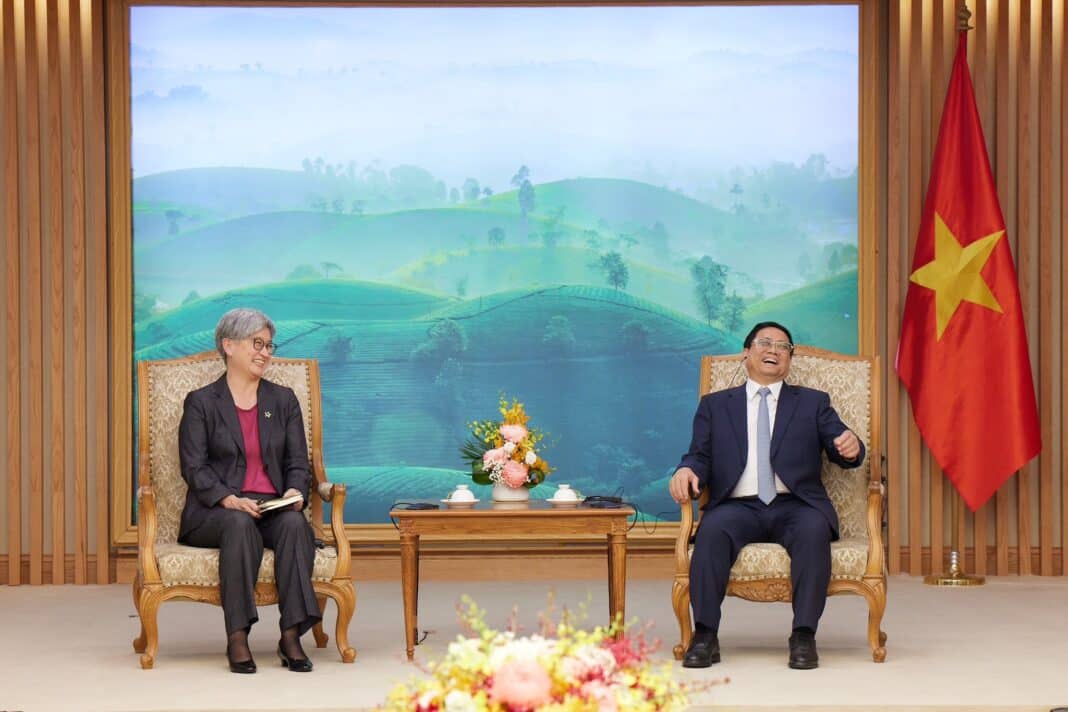Australia is working with Vietnam on “climate change adaption” and is committed to a regional “clean energy transition,” according to Foreign Affairs Minister Penny Wong.
The Australian Foreign Affairs Minister made the commitments in Hanoi along with a $94.5 million commitment to help with climate change resilience in the Mekong Delta.
The package will help more than one million farmers transition to more climate-resilient and resource-efficient ways of living.
It will help protect forests degraded from severe coastal erosion and land subsidence as farmers clear mangrove forests to operate shrimp ponds.
Attending the Australia-Vietnam Foreign Affairs Meeting, which the minister co-hosted with Vietnamese counterpart Bui Thanh Son, she noted that “Vietnam is important to Australia as a part of ASEAN.”
The meetings have been held annually since 2018 and focus on deepening cooperation in trade, digital services, security and, increasingly, climate change.
Increasingly, Vietnam has emerged as an international manufacturing powerhouse, with Western Companies looking to decouple from China.
Australia has committed to expanding trade and investment and wants to “work together on the big challenges of our time, which include climate change,” Minister Wong said at a press conference on Thursday.
The forest sector is essential in driving trade and investment, with its long-term prosperity directly impacted by climate change.
Vietnam has invested heavily in afforestation and, in 2021, committed to planting one billion trees in predominantly urban and rural areas over the next five years.
Vietnam PM flags forestry reforms to improve competitiveness
In April, Vietnam Prime Minister Pham Minh Chinh highlighted the importance of improved competitiveness in processing, post-harvest, and market development to address a decline in forestry exports.
Vietnam is looking to revise trade rules, crack down on illegal logging and create better policies for market growth.

This includes high-tech forestry parks that have become a magnet for foreign investment, using state-of-the-art technology to improve the forest’s productivity, production and efficiency.
Vietnam News reported that the industry faces several challenges, including increased dependence on imported raw materials, reduced demand and increased competitiveness in significant markets, including the United States, Europe, and Japan.
Together, these markets account for 90% of total exports – with Vietnam now looking to new markets, including Australia, to diversify trade flows.
The commitment could be an investment signal, with Vietnam looking to foreign direct investment to modernise its forest products industry.
The Vietnamese forest products export volumes reached US $17.1 billion in 2022, and according to UN data, Vietnam is amongst the largest exporters of wood pellets, veneer sheets, and recovered paper.

Vietnam is a country with seemingly limitless potential
In a report published by the IMF, Vietnam is forecast to be the second best-performed ASEAN economy for 2023 and will replace the Philippines as the best-performed economy in 2024.
Vietnam’s timber and forest products are exported to over 140 countries and territories, with non-timber-based forest products (including bamboo, rubber, and grass) identified as a significant growth market.
According to the Timber Trade Portal, just 30 per cent of timber-related exports were the raw material.
Through the 1990s, the Vietnamese government invested heavily in plantation establishment.
The 1993 Land Law, for example, drove a surge in plantation forestry. The Act saw millions of households allocated land on lease terms for agriculture and forestry.
Now, small landowners manage more than 42.6% of the 4.39 million hectares of plantation resources – chipped for wood pallets; Vietnam now supplies 50% of the Asia Pacific hardwood woodchip market.
Vulnerability: 5 to 6 million cubic metres of raw materials imports
Despite its manufacturing strength, Vietnam relies heavily on imported hardwoods.
In April, Wood Central reported that the country imports between 5 to 6 million cubic metres from more than 100 countries to meet its commitments for hardwood furniture.
Vietnam is the second largest exporter of furniture in the world, following a period of intense expansion.
Global growth for the sector averaged 2.7% during 2015-2020 to an average annual value of $US68.3 billion, while Vietnam’s market share increased from 5.8% (2015) to 14.5% (2020).
And whilst Vietnam produces more than 20 million cubic metres of plantation wood, it is rarely used for furniture because plantation timber, such as acacia, is deemed inferior to hardwoods.

Not only does this leave the country vulnerable to volatility in the global supply of timber, but it also leaves it at greater risk of ‘high-risk’ legality concerns.
In 2020, US-based Mongabay reported that at least one-third of tropical hardwoods imported for Vietnam-manufactured products are from “high-risk” locations.
More than 40% of Vietnam’s exports end up in US Markets, with Vietnam and the US working on a new agreement to target illegal logging in the furniture industry.
In light of the push by the EU to implement its Deforestation Regulation, the Vietnam delegation also committed to boosting cooperation with material timber exporting countries.
It will amend legal documents to improve monitoring and surveillance of illegal timber and control the seized wood so it doesn’t enter supply chains.






